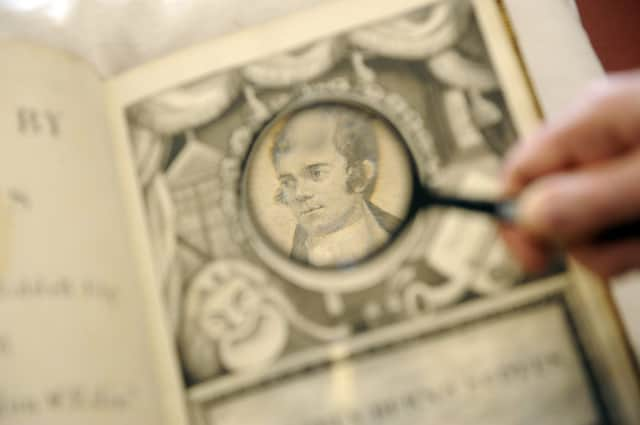StAnza 2014: First World War the focus


AS THE nation prepares to go to the polls to decide on the future of the union, even Scotland’s Bard has been drawn into the debate with the Yes campaign claiming Robert Burns would have supported independence.
Dubbed as “perhaps the ultimate celebrity endorsement”, Yes Scotland has been quick to lay claim to Burns’ vote, and with the help of University of the St Andrews poet and academic, Robert Crawford, the Yes camp believe this theory can be proved right. The professor of modern Scottish literature claims the words of Burns with which we are all so familiar, show the Bard had “patriotic tendencies” and would have been in favour of an independent Scotland. Burns enthusiasts meanwhile insist that pinning down the poet’s political persuasion is not that easy and his work could be interpreted in a number of different ways.
Advertisement
Hide AdAdvertisement
Hide AdThe notion that Burns would have supported independence or alternatively held allegiance to the union, will no doubt spark many a debate at Burns Suppers across the country and beyond as people take time to celebrate our most famous poet’s birthday. However, referendum aside, there is still much about 2014 which will prove to be historic as of course this year marks the centenary of the start of the First World War. It is with this in mind that StAnza, Scotland’s International Poetry Festival, was prompted to choose as one of its themes for this year’s festival, Words Under Fire.
At venues around the Fife town of St Andrews from 5-9 March 2014, the festival will include a world-class collection of war poets’ work, exhibitions and poetry events highlighting the poetic legacy of the First World War and other conflict.
The impressive line up of poets includes John Greening, whose recent collection To the War Poets explores what happens when a modern poet sends dispatches across the decades; Jenny Lewis, whose latest book is an account of the Iraq wars of the past 100 years, and Alex Gwyther’s spoken word story of the Christmas truce from 1914.
A major mixed-media installation by artist Stephen Raw, originally opened in London by National Poet Laureate and StAnza 2014 headliner Carol Ann Duffy, will be displayed in the Town Hall in St Andrews. “Was it for this the Clay Grew Tall?” has been inspired by the renowned poetry of Wilfred Owen and the music of Benjamin Britten in his choral masterpiece, the War Requiem. Duffy has described the exhibition as “a timely, truly visionary response to the genius of both Wilfred Owen and Benjamin Britten and to the pity and horror of war”.
Headliner David Constantine will give the StAnza lecture, The Great War at Home and Abroad, exploring not only war poetry written in English but also some from France and Germany.
StAnza 2014’s popular Past and Present events will also have a war focus, with modern poets celebrating the work of the past, including Alexander Hutchison on David Jones, author of In Parenthesis. With First World War centenary events taking place throughout the year, the festival aims to provide a fitting tribute and a credible contribution to mark the 100th anniversary of the war and all those who fought it in.
There is no doubt the legacy of war will be held true as a number of poets performing at the festival will be recounting first-hand experiences. The Words Under Fire programme include Brian Turner, a poet who served as a soldier in Iraq, Tomica Basji, who fought in the Balkans, and Suzanne Steele, a Canadian poet who went to Afghanistan as a war artist.
The festival programme is not restricted to the written word, with the inclusion of Stephen Raw’s exciting installation which crosses art forms to interpret musical and poetic visions of war.
Advertisement
Hide AdAdvertisement
Hide AdIt is these poets and artists who not only remind us of the legacy of the poetry of the Great War but that war poetry continues to have relevance today and StAnza 2014 will give audiences the opportunity to consider war poetry from a modern perspective.
• Louise Robertson is press and media manager at StAnza www.stanzapoetry.org/booking.php
SEE ALSO